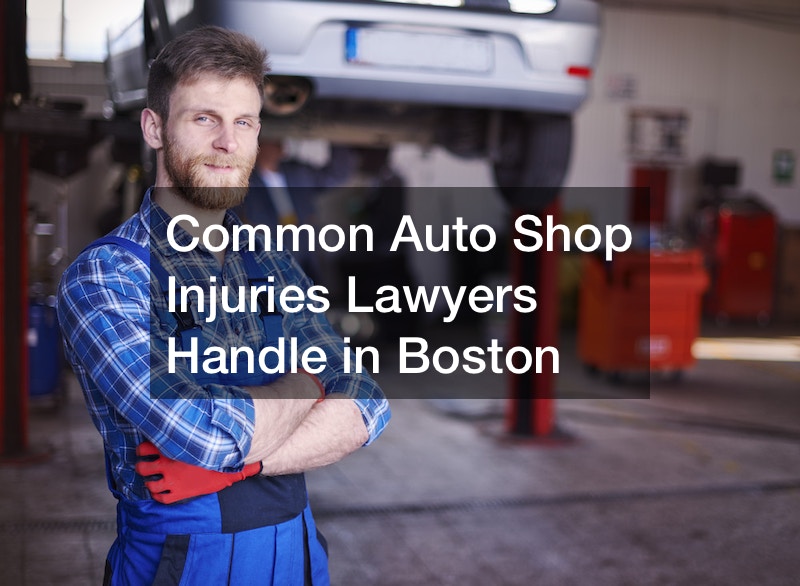
Auto shops are busy a place where mechanics and technicians work on various vehicles. No matter how safe an auto shop is, accidents can still happen. Auto shops have many hazards that can result in injuries to the workers. In Boston, accident attorneys handle cases related to auto shop injuries. This article discusses common types of auto shop injuries so workers can take necessary precautions to ensure a safer working environment.
Back Injuries
Back injuries are a common problem in auto shops. These auto shop injuries occur because of physical demands. Mechanics and technicians often lift heavy objects, work in awkward positions, and perform repetitive motions. Accident attorneys claim these tasks put a significant strain on the back. This strain leads to conditions like strains, sprains, herniated discs, or chronic back pain.
Accident attorneys that specialize in auto shop injuries assist workers with claims for compensation of medical expenses, lost wages, and pain and suffering from back injuries. They must prove liability and ensure that the individual that was injured receives the compensation they deserve. Mechanics lift heavy objects like tires, tools, and engine components. The repetitive lifting and carrying heavy loads can strain the muscles in the back, which can lead to injuries like muscle strains, sprains, or herniated discs. Mechanics also work in awkward positions during repairs and maintenance tasks. They have to twist, bend, or reach into tight spaces under vehicles or in engine compartments. These positions put excessive stress on the spine, which can increase the risk of back injuries.
Auto repair work involves repetitive motions like bending, twisting, and reaching. These repetitive movements over time can lead to overuse injuries. Mechanics spend long hours on their feet while working on vehicles or performing tasks that require them to stand in one place. This type of standing causes muscle fatigue, muscle imbalances, and increased pressure on the spine. These symptoms cause back pain and discomfort.
Eye Injuries
Auto repair involves tasks that have a significant risk of eye injury. Mechanics work with equipment, tools, and chemicals that can cause sparks, foreign objects, or hazardous materials to come into contact with the eyes. These substances can lead to a range of injuries, from minor irritation to severe damage that requires immediate medical attention. Accident attorneys that specialize in auto shop injuries understand the complexities of eye injuries and help workers obtain the compensation they deserve.
Auto mechanics work with power tools, such as drills, grinders, and impact wrenches. These tools generate sparks and flying debris. Other tasks such as sanding, grinding, or cutting metal produce small metal fragments that can become airborne. If technicians aren’t wearing proper eye protection, goggles, or safety glasses, the flying debris gets to the eyes. Auto technicians use solvents and chemicals like paints, adhesives, and degreasers. These liquids can cause irritation and chemical burns.
A common task in a shop is soldering and welding. This equipment is used for repairing exhaust systems and joining metal. Intense light is generated during these actions. The light can release dangerous ultraviolet light. If technicians aren’t wearing proper eye protective gear, they can suffer from flash burns and long-term damage.

Lacerations
Technicians that work in an auto shop commonly get lacerations as a result of the jobs they perform and the tools they use. Lacerations are common auto shop injuries caused by sharp objects. These are wounds to the skin that doesn’t have missing skin. Mechanics use many sharp tools and equipment like wrenches, screwdrivers, saws, grinders, and cutting tools. These tools can slip or make contact with the skin, which can cause lacerations.
Auto shops and motorhome repairs have metal components and parts with sharp edges. As technicians work on different vehicles, they work with sharp edges of body panels and engine components, which must be handled carefully. When mechanics haven’t been trained properly, they may not learn proper handling techniques, which can contribute to lacerations in auto shops. When individuals place their fingers in unsafe positions while performing repairs, it can lead to contact with sharp objects. Tools must be properly stored and secure so they don’t fall or slip and cause potential lacerations. There is equipment in an auto shop that could have pinch points. These are areas where moving parts come together and close. This causes the risk of trapping or crushing body parts. When fingers or hands get caught in a pinch point, it can lead to severe injuries.
Burns
Burns can occur from auto shop injuries and farm equipment because of the work they perform. Technicians come into contact with chemicals and various heat sources. Engines, exhaust systems, or metal parts are heated during the vehicle’s operation. If a mechanic comes into contact with hot surfaces, it can cause thermal burns. These burns damage the skin and tissue. Other fluids, like coolant, motor oil, and brake fluid, are also heated during use. Hot chemicals and liquids can cause splashes and spills. Welding is a common practice in shops, and it produces sparks and intense heat and sparks. It’s important that protective measures are taken to prevent burns.
It’s possible for shop equipment or farm machinery to have electrical malfunctions. When this happens, there could be short circuits or electrical fires. Live wires and These incidents exposed electrical components may cause electrical burns. It’s also possible for equipment to explode or have flames. This causes direct exposure to high temperatures, combustible material, and flames. Gasoline and diesel fuel are flammable and, when not handled properly, can spill, leak, or ignite. This can result in fires and burns.

Sprains and Strains
Strains and sprains may be more common auto shop injuries than you realize. Workers are lifting heavy objects, like tires and engines. This can lead to overexertion, especially when improper lifting techniques are used. They work in awkward positions because they have to fit into tight spaces. This causes stress on the muscles and skeletal system. They also handle mounting and balancing tasks, which strain muscles and joints. The repetitiveness of auto repair work causes strains on the body. When a technician is constantly reaching, bending, or twisting, it can cause overuse or strain injuries.
Auto shops often have slippery or uneven surfaces. There is often debris, oils, and fluids on the floor. No matter how clean the shop is, there are always spills. This can cause slips, trips, or loss of balance. When a mechanic mishandles tools, it can cause unexpected and sudden movement. This type of exertion can cause sprains and strains. There are ways to help technicians prevent these injuries. If mechanics take regular breaks and vary tasks, it can prevent injuries from overuse injuries and repetitive motion. When mechanics have access to appropriate personal protective equipment, they can help prevent these accidents.
Workers Comp Cases
Workers’ compensation cases can occur as a result of auto shop injuries and injuries in steel foundries. Workers’ compensation is an insurance that provides benefits to employees with work-related injuries or illnesses. When an auto shop worker is injured while performing job duties, they may be eligible to file a Workers’ compensation claim. These injuries could include strains, sprains, burns, lacerations, and other injuries. The process and benefits vary depending on the area in which the worker was injured. The circumstances around the injury also impact a workers’ compensation claim.
Auto shop workers are exposed to risks and hazards leading to injuries. These injuries can range from minor incidents to severe accidents. Working in a steel foundry is a physically demanding and hazardous job. Steel foundry workers come into contact with molten metal, high temperatures, heavy machinery, and various chemicals. These conditions increase the risk of accidents and injuries. If a worker in a steel foundry suffers an injury, they may be eligible to file a workers’ compensation claim. These benefits can cover medical expenses, rehabilitation costs, lost wages, and disability benefits.

Transportation-Related Injuries
Transportation-related injuries can occur during long distance moving. They aren’t always related to auto shop injuries; however, they do share some similarities. There also could be instances where auto shop technicians are responsible for moving vehicles. Anytime vehicles are being transported; there could be accidents. Accident attorneys with knowledge of auto shop injuries often handle cases involving transportation-related accidents. They can help those that are injured navigate the legal process and obtain compensation.
Individuals typically move heavy objects, like furniture and boxes, during a move. When improper lifting techniques are used, they can cause strains and sprains. It’s possible that individuals have overexertion injuries when they attempt to move objects that are too heavy. Long distance moving may involve vehicle accidents like collisions or rollovers. There are many factors that can cause these accidents, including driver negligence, road conditions, or mechanical failures. Injuries that result from these accidents include fractures, head injuries, or whiplash. Moving also includes using equipment like hand trucks, dollies, and ramps to help move heavy objects. When these items aren’t used properly, they can cause accidents like boxes and objects falling, which also causes injuries.
Equipment Failure Injuries
Auto shops use a large amount of equipment and machinery to perform repairs. Equipment failures can occur due to malfunctioning garage doors, defective tools, or faulty machinery. These failures can lead to serious auto shop injuries, including crush injuries, fractures, or amputations. Lawyers specializing in auto shop injuries work with those who are injured to hold those who are responsible and accountable for equipment failures.
Auto shops typically have large garage doors to accommodate vehicles. These doors rely on mechanical systems for operation. They have pulleys, springs, and motors. When these systems malfunction or are not properly maintained, accidents can happen. A faulty garage door may suddenly drop or close unexpectedly, trapping or injuring workers. Garage doors should have appropriate safety features to prevent accidents. These features may include photoelectric sensors that detect objects or individuals in the door’s path. They should also have automatic reversal mechanisms that stop and reverse the door if there is an obstruction. Garage doors should have an emergency release allowing the door to be manually opened in case of power failure.

Slip-and-Fall Injuries
Auto shops can have slippery surfaces, increasing the risk of slip-and-fall accidents. Mechanics suffer fractures, sprains, or head injuries from these types of auto shop injuries. Accident attorneys are helpful in filing claims against negligent parties, including auto shop owners or maintenance companies. Emergency drain cleaning services can help prevent slip-and-fall injuries. These services address potential hazards related to drainage systems. These services specialize in clearing clogged drains. When drains are clogged, they lead to standing water, which creates slippery surfaces. When standing water is removed quickly, it eliminates slip-and-fall hazards.
Auto shops usually have floor drains to allow liquids like oil, coolant, or cleaning agents to drain. Service bays or washing stations are prone to fluid spills, leaks, or splashes. Drain cleaning services can identify and address drainage issues in these work areas. They also ensure that the fluids are drained away, minimizing slip-and-fall risks. Drain cleaning services also help maintain clean conditions in the drainage systems. They prevent the accumulation of debris and contaminants that can contribute to foul odors, bacterial growth, and health hazards.
Chemical Exposures
Auto shops utilize chemicals that are hazardous to the health of employees and cause auto shop injuries. Employees who use chemicals without proper safety equipment may have skin irritation, respiratory issues, and long-term health concerns. Professional janitorial services can help prevent chemical exposures. They are trained and have experience handling many different chemicals.
They are professionals that understand risks, safe handling, and the properties of chemicals. With this knowledge, they select the proper cleaning tools and products that should be used for a particular job. They can teach employees how to use them safely and minimize exposure to chemicals. Cleaning chemicals are often typically only safe when they’ve been mixed or diluted properly. This is also when they’re most effective. Cleaning agents release fumes that can be harmful if inhaled in high amounts. Professional janitorial services ensure proper ventilation during the cleaning process.
Auto shop injuries can be severe, with physical and financial consequences. Boston accident attorneys specialize in auto shop injuries to provide legal support to injured individuals. When you understand common auto shop injuries, you can help create a safer environment.


